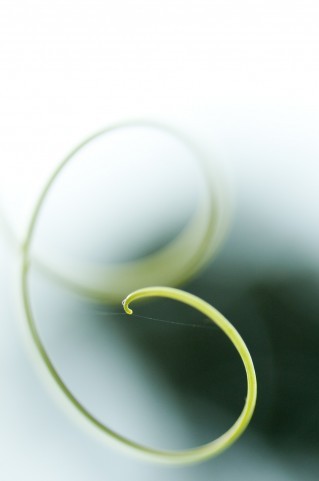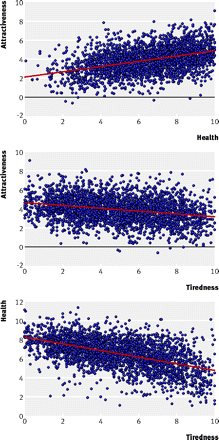BMJは毎年12月にクリスマス特集としてユニークな研究を発表しています。「コンサートのはげしい首振り(ヘッドバンギング)は頭頚部障害のリスクになるか?」「WiiとXbox 360のカロリー消費量の比較」など。え?!という内容が揃います。
「十分な睡眠は健康によい(Beauty Sleep)」。実は、このことが科学的に確認されたのは、今回がはじめてのようです。
英国医学雑誌が大まじめに取り組むユーモアと笑いのセンスをいただきましょう。
Beauty sleep: experimental study on the perceived health and attractiveness of sleep deprived people
BMJ. 2010 Dec 14;341:c6614
全文が読めます

メモ)
・対象は、スウェーデンの健康な成人23人(18~31歳)
・実験研究
・顔写真を1人2枚撮影。8時間以上睡眠して、翌日の午後2~3時に1枚撮影。もう1枚は、1日目に5時間しか睡眠せず、2日目徹夜、3日目の午後2~3時に撮影。
・訓練を受けていない65人が評価者が、特別な2枚の写真をランダムな順番で6秒間ずつ見せて、健康度、疲労度、魅力を評価してもらった。
・睡眠不足後の写真は、8時間以上寝た後の写真と比べ、健康度が低く(100点満点で平均63点対68点)、疲労度が高く(53点対44点)、魅力も低かった(38点対40点)。
・一部は、睡眠不足の方が、健康度が高く、疲労度が低かった。これが偶然なのか?、対象者や評価者の特性によるものかは、今後の研究が必要。
Objective To investigate whether sleep deprived people are perceived as less healthy, less attractive, and more tired than after a normal night’s sleep.
Design Experimental study.
Setting Sleep laboratory in Stockholm, Sweden.
Participants 23 healthy, sleep deprived adults (age 18-31) who were photographed and 65 untrained observers (age 18-61) who rated the photographs.
Intervention Participants were photographed after a normal night’s sleep (eight hours) and after sleep deprivation (31 hours of wakefulness after a night of reduced sleep). The photographs were presented in a randomised order and rated by untrained observers.
Main outcome measure Difference in observer ratings of perceived health, attractiveness, and tiredness between sleep deprived and well rested participants using a visual analogue scale (100 mm).
Results Sleep deprived people were rated as less healthy (visual analogue scale scores, mean 63 (SE 2) v 68 (SE 2), P<0.001), more tired (53 (SE 3) v 44 (SE 3), P<0.001), and less attractive (38 (SE 2) v 40 (SE 2), P<0.001) than after a normal night’s sleep. The decrease in rated health was associated with ratings of increased tiredness and decreased attractiveness.
Conclusion Our findings show that sleep deprived people appear less healthy, less attractive, and more tired compared with when they are well rested. This suggests that humans are sensitive to sleep related facial cues, with potential implications for social and clinical judgments and behaviour. Studies are warranted for understanding how these effects may affect clinical decision making and can add knowledge with direct implications in a medical context.
これから)一方で重要なのは、「疲労度の点数の高い写真ほど、健康度の点数が低く、魅力の点数も低い傾向があった。」という点。つまり、ビューティーは、疲労→健康→魅力の順で作られる仮説。今夜は、Sleep Beautyを。



コメント